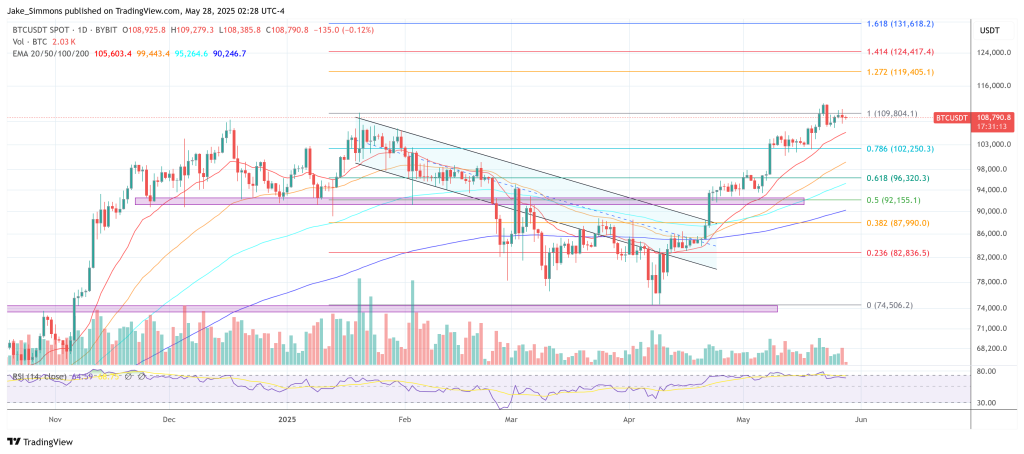Cause to belief

Strict editorial coverage that focuses on accuracy, relevance, and impartiality
Created by business specialists and meticulously reviewed
The best requirements in reporting and publishing
Strict editorial coverage that focuses on accuracy, relevance, and impartiality
Morbi pretium leo et nisl aliquam mollis. Quisque arcu lorem, ultricies quis pellentesque nec, ullamcorper eu odio.
US Treasury Secretary Scott Bessent has signalled that the long-debated overhaul of banks’ supplementary leverage ratio (SLR) is imminent—a coverage pivot that would reverberate by Bitcoin markets—telling tv interviewers that regulators are “very near shifting” on the rule and that the adjustment might compress Treasury yields by “tens of foundation factors.”
Rocket Gasoline For Bitcoin
Though the proposal should nonetheless clear the Federal Reserve, the Workplace of the Comptroller of the Foreign money and the FDIC, the route of journey is obvious: exempting, or partially exempting, US Treasuries from the SLR will let giant banks recycle balance-sheet capability into contemporary purchases of presidency debt.
The SLR, launched after the 2008–2009 disaster, forces even risk-free belongings similar to Treasuries to hold a capital cost; a worldwide systemically essential financial institution should fund 5 cents of fairness for each greenback of complete belongings, together with central-bank reserves. Bessent’s plan would carry that burden for sovereign bonds, a step the business has lobbied for for the reason that short-term pandemic waiver expired in March 2021. Kevin Fromer, chief government of the Monetary Companies Discussion board, calls the present leverage-based stack “outdated and at odds with monetary stability and financial development,” describing aid as crucial “to higher serve US taxpayers, capital markets, customers, companies, and the financial system.”
Associated Studying
Whereas officers body the transfer as a micro-prudential calibration, the macro-liquidity impulse is substantial. Market commentator Furkan Yildirim tells his 103,000 subscribers that US banks collectively maintain about $5 trillion in Treasuries; eliminating the five-percent capital haircut would liberate roughly $250 billion of tier-one capital—fifty instances the Federal Reserve’s present month-to-month quantitative-tightening tempo of $5 billion. “It is a liquidity injection by regulatory pen stroke,” he says, including that the step “lowers yields with out the Fed printing cash,” a combination that traditionally pushes traders additional out the chance curve.
The market is already buying and selling on that expectation. Benchmark ten-year yields slid under 3.95 p.c after Bessent’s remarks and after President Trump deferred a threatened 50 p.c tariff on EU items till 9 July. Yildirim argues that “each basis-point drop within the ten-year is mainly a advertising marketing campaign for Bitcoin,” as a result of “liquidity doesn’t disappear—it simply appears for a brand new residence.” He stresses that the Treasury’s willingness to alter bank-capital guidelines, somewhat than depend on the central financial institution, “tells you ways cornered policymakers really feel by deficits, debt service and political optics.”
Associated Studying
Not everyone seems to be satisfied the rule change will work as supposed. Critics similar to Peter Boockvar of Bleakley Advisory observe that banks’ urge for food for period threat has not totally recovered for the reason that 2023 regional-bank failures; if sellers fail to soak up the incremental Treasury provide, the Federal Reserve could possibly be pressured again into the market. The Financial institution Coverage Institute, whereas welcoming SLR aid, argues that it have to be paired with a broader rethink of post-crisis overlays such because the GSIB surcharge and the stress-test regime to unlock balance-sheet capability on a long-lasting foundation.
Bitcoin, nevertheless, responds reflexively to dollar-liquidity metrics. Decrease Treasury yields diminish the attract of money-market funds paying north of 5 p.c, releasing capital that has been parked in cash-equivalent automobiles since 2022. On-chain knowledge highlighted by Yildirim present over-the-counter (OTC) desk inventories sliding to 115,000 BTC, proof that enormous consumers are sourcing cash immediately; when that inventory is depleted, desks should restock from public exchanges, a dynamic that tightens float and traditionally amplifies upside strikes.
Finally the SLR reprieve is not any panacea for America’s fiscal arithmetic, but it surely removes a near-term balance-sheet choke level and lowers the chance value of holding non-yielding belongings. As Yildirim places it, “A deregulation that stabilises sovereign funding whereas nudging traders into threat belongings is, nearly by definition, a tailwind for Bitcoin.” In that sense the rule change features like shadow quantitative easing, arriving at a second when the Federal Reserve is hamstrung by sticky inflation and political constraints—another structural catalyst for Bitcoin.
At press time, BTC traded at $108,790.

Featured picture created with DALL.E, chart from TradingView.com

